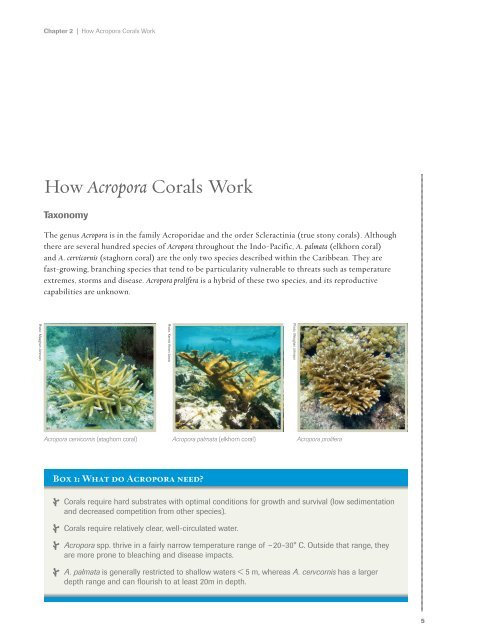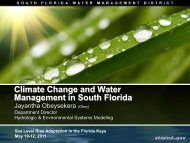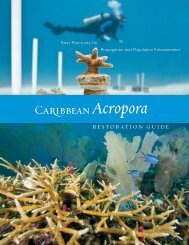Caribbean Acropora Restoration Guide - The Florida Reef ...
Caribbean Acropora Restoration Guide - The Florida Reef ...
Caribbean Acropora Restoration Guide - The Florida Reef ...
Create successful ePaper yourself
Turn your PDF publications into a flip-book with our unique Google optimized e-Paper software.
Chapter 2 | How <strong>Acropora</strong> Corals Work<br />
How <strong>Acropora</strong> Corals Work<br />
Taxonomy<br />
<strong>The</strong> genus <strong>Acropora</strong> is in the family Acroporidae and the order Scleractinia (true stony corals). Although<br />
there are several hundred species of <strong>Acropora</strong> throughout the Indo-Pacific, A. palmata (elkhorn coral)<br />
and A. cervicornis (staghorn coral) are the only two species described within the <strong>Caribbean</strong>. <strong>The</strong>y are<br />
fast-growing, branching species that tend to be particularity vulnerable to threats such as temperature<br />
extremes, storms and disease. <strong>Acropora</strong> prolifera is a hybrid of these two species, and its reproductive<br />
capabilities are unknown.<br />
Photo: Meaghan Johnson<br />
Photo: Kermit Amon-Lewis<br />
Photo: Meaghan Johnson<br />
<strong>Acropora</strong> cervicornis (staghorn coral) <strong>Acropora</strong> palmata (elkhorn coral) <strong>Acropora</strong> prolifera<br />
Box 1: What do <strong>Acropora</strong> need?<br />
Corals require hard substrates with optimal conditions for growth and survival (low sedimentation<br />
and decreased competition from other species).<br />
Corals require relatively clear, well-circulated water.<br />
<strong>Acropora</strong> spp. thrive in a fairly narrow temperature range of ~20–30° C. Outside that range, they<br />
are more prone to bleaching and disease impacts.<br />
A. palmata is generally restricted to shallow waters < 5 m, whereas A. cervcornis has a larger<br />
depth range and can flourish to at least 20m in depth.<br />
5











